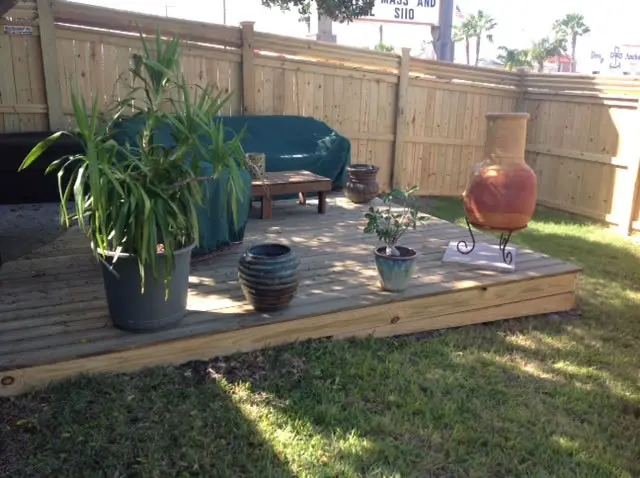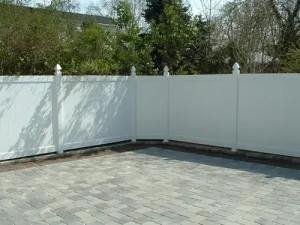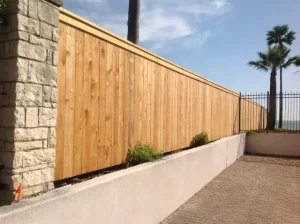![The Great Fence Debate Wood Versus Vinyl [How to Choose]](https://www.dcfence.com/wp-content/uploads/2024/04/The-Great-Fence-Debate-Wood-Versus-Vinyl-How-to-Choose-300x157.webp)
The Great Fence Debate: Wood Versus Vinyl [How to Choose?]
When it comes to enhancing the privacy, security, and aesthetic appeal of your home, few elements play as pivotal a role as your choice of

When it comes to enhancing our homes and properties, a well-crafted fence provides security and privacy and adds a touch of aesthetic charm.
However, selecting the best type of wood for a fence can be daunting, with various options available.
We will explore the factors to consider when choosing the best type of wood for fence, ensuring a durable and visually appealing investment that stands the test of time. Whether you’re a seasoned DIY enthusiast or a first-time homeowner, let’s delve into the world of wood and find the perfect match for your fencing needs.
Discover the Perfect Wood for Your Fence
When embarking on the journey of selecting the ideal wood for your fence, several crucial factors demand careful consideration. First and foremost, durability plays a pivotal role. Familiarizing yourself with the various wood species and their resistance to rot, insects, and the impact of weather conditions is essential in making a long-lasting choice. Additionally, striking the right balance between quality and budget is crucial, as wood options can vary significantly in cost.
Another vital aspect to weigh is maintenance, as different wood types may necessitate varying levels of upkeep over time. Lastly, pay attention to aesthetics – contemplating the appearance and natural characteristics of various wood species will ensure that your fence serves its functional purpose and adds an appealing touch to your property. By exploring these essential factors, you’ll be well-equipped to decide on the best type of wood for your fencing project.
When deliberating between softwood and hardwood for your fence construction, weighing the pros and cons of each category is crucial. Softwood options like Pine, Cedar, Redwood, and Spruce offer advantages such as affordability, ease of installation, and a natural charm that complements various architectural styles. However, they may require frequent maintenance and be more susceptible to decay and insects.
On the other hand, hardwoods like Oak, Ipe, Mahogany, and Teak boast exceptional durability, resistance to pests and weathering, and an exquisite appearance that exudes elegance and sophistication. Nevertheless, hardwoods are generally more expensive and may pose challenges during installation due to their density. By carefully assessing these factors, you can make an informed decision that aligns with your specific needs and preferences, ensuring a fence that not only stands strong but also enhances the overall beauty of your property.
Several wood species have gained popularity for their exceptional qualities in constructing fences. Western Red Cedar stands out for its natural beauty, resistance to decay, and versatility, making it an excellent choice for various fence styles. White Cedar, known for its durability and insect resistance, is also worth considering, though it may require more maintenance over time. With its striking appearance and impressive durability, Redwood is another sought-after option for long-lasting and visually appealing fences.
Pressure-treated Pine offers a budget-friendly alternative, treated to resist rot and insect damage, but it’s essential to be cautious about potential chemical leaching. Finally, Cypress, admired for its unique grain patterns and natural oils that deter decay, is an attractive and durable choice, particularly for areas with varying climates.
Understanding the characteristics, benefits, and considerations of these popular wood species will guide you in selecting the perfect fence material to suit your needs and preferences.
Exotic wood species offer compelling options for those seeking a distinctive and exceptional look for their fences. Ipe, renowned for its remarkable hardness and resistance to decay, promises a fence that can withstand the test of time with minimal maintenance. Cumaru, boasting impressive natural durability and resistance to insects and rot, offers an alluring choice for a long-lasting fence.
Mahogany, favored for its rich color and elegant appearance, brings beauty and durability to the forefront, but it may require regular maintenance to preserve its splendor. Tigerwood, with its striking tiger-like grain pattern and excellent hardness, adds a touch of visual intrigue to any fence project, and proper maintenance can help retain its allure for years to come.
Vinyl fences have become increasingly popular due to their low maintenance requirements and resistance to rot and insects. However, it’s important to note that they may lack the natural appeal of wood. When considering fencing options beyond traditional wood, alternative materials bring numerous advantages and offer unique features.
Composite fences, made from a blend of wood fibers and recycled plastic, offer exceptional durability and sustainability while mimicking the appearance of wood. Metal fences come in various types, such as aluminum, steel, and wrought iron, each offering benefits, including strength, longevity, and security. Lastly, for those seeking an eco-friendly option, bamboo stands out as a renewable resource with a distinct appearance that adds a touch of exotic beauty to any landscape.
Selecting the perfect wood for your fence design plays a pivotal role in achieving a seamless blend of functionality and aesthetics. For a classic Vertical Board Fence, durable softwoods like Cedar or Redwood are excellent choices, but considering pressure-treated Pine can provide a more budget-friendly option without compromising on longevity. Picket Fences, whether traditional or with a modern twist, are beautifully complemented by the natural charm of Cedar or the sturdiness of White Oak.
When it comes to Privacy Fences, dense hardwoods such as Ipe or Mahogany offer robust security and an elegant and sophisticated appearance. Rustic Split Rail Fences exude a timeless appeal, and Cedar or Cypress wood’s natural beauty harmonizes perfectly with this design. For the eye-catching Shadowbox Fence, selecting woods with appealing grain patterns, such as Redwood or Cypress, can enhance the visual appeal and create an attractive boundary for your property.
Ensuring the longevity of your wood fence involves essential preparation and treatment steps. Wood treatment methods, such as pressure treatment, chemical treatments, and natural alternatives, help fortify the wood against decay and insect infestations. Staining and sealing the wood enhance its visual appeal and provide a protective barrier against moisture, UV rays, and other environmental elements.
Careful consideration of color choices and proper application techniques can further extend the lifespan of your fence. Additionally, preventing rot and insect damage requires meticulous installation techniques, including adequate drainage and ground clearance.
Proper maintenance is critical to ensuring the longevity and beauty of your wooden fence. Regular cleaning is essential to remove dirt, debris, and mildew buildup. Use a gentle detergent or a mixture of water, vinegar, and a soft-bristled brush to clean the surface. Stain and sealant maintenance should be performed every few years, depending on your climate and the fence’s wear and tear. Before reapplication, ensure the fence is clean and dry, and consider using a quality stain or sealant product to protect the wood from UV rays and moisture. Inevitably, some parts of the fence may suffer damage over time.
Promptly address any issues by repairing or replacing damaged wood to maintain the fence’s structural integrity. Finally, as winter approaches, take proactive measures to protect your fence from harsh weather conditions. Remove any snow buildup to prevent undue stress on the wood, and consider applying a protective coat of sealant to shield it from the elements.
Choosing the best type of wood for your fence involves considering factors like durability, cost, maintenance, and aesthetics. Softwoods like Cedar and Redwood offer timeless charm, while hardwoods like Ipe and Mahogany provide strength and elegance. Alternative materials are also worth exploring. Proper wood treatment and maintenance are crucial for longevity. With D&C Fence Co.’s expertise and commitment to our customer satisfaction, you can trust us to help you make the perfect wood choice for your fencing needs.
Whether you desire a classic picket fence or a modern privacy fence, our team of professionals will guide you every step of the way to create a stunning and enduring addition to your property. Contact us and let our exceptional service and craftsmanship transform your vision into a reality.
By submitting, you agree to receive emails from Uscreen and to our privacy policy.
![The Great Fence Debate Wood Versus Vinyl [How to Choose]](https://www.dcfence.com/wp-content/uploads/2024/04/The-Great-Fence-Debate-Wood-Versus-Vinyl-How-to-Choose-300x157.webp)
When it comes to enhancing the privacy, security, and aesthetic appeal of your home, few elements play as pivotal a role as your choice of

PVC (Polyvinyl Chloride) fencing is a type of synthetic plastic fence that offers a modern alternative to traditional materials like wood and metal. Distinguished by

Wood fences are one of the most traditional and versatile types of fencing used to delineate property lines, enhance privacy, and contribute to the aesthetic
Complete the form below and a representative will contact you shortly.